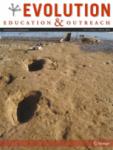
The latest issue of Evolution: Education and Outreach — the new journal promoting the accurate understanding and comprehensive teaching of evolutionary theory for a wide audience — is now published. The theme for the issue (volume 4, number 2) is Evolutionary Theory and its Application to New World Settlement Studies, edited by Rolando González-José. Articles include "The Prehistoric Colonization of the Americas: Evidence and Models"; "Following the Tracks of the First South Americans"; "The Theory of Evolution, Other Theories, and the Process of Human Colonization of America"; "Social Dimensions of Evolutionary Research: Discovering Native American History in Colonial Southeastern U.S."; "Integrating Different Biological Evidence Around Some Microevolutionary Processes: Bottlenecks and Asian-American Arctic Gene Flow in the New World Settlement"; and "Contradictions and Concordances in American Colonization Models." Plus there are various articles on the teaching of evolution, book reviews, and commentaries.
Also included is the latest installment of NCSE's regular column, Overcoming Obstacles to Evolution Education. In "Misconceptions about the Settlement of the Americas," NCSE's Glenn Branch and Eric Meikle interview Kenneth L. Feder, the author of the standard textbook on the subject, Frauds, Myths, and Mysteries: Science and Pseudoscience in Archaeology, now in its seventh edition. "How could it not be important to truly understand a crucial part of the human past: the discovery and populating of two continents?" Feder asks. "In essence, the exploration of, migration to, settlement of, and adaptation to the many and diverse environments of the New World provides anthropologists, historians, cultural geographers, human ecologists, demographers, etc., with what amounts to a laboratory in which they can study the myriad ways in which people create ways to live. Understanding the timetable for these adaptations, the source populations, and the environmental changes these people faced can help to illuminate the human condition and, if we're lucky, remind us in the present about ancient responses to the sometimes remarkably similar challenges we face today."
